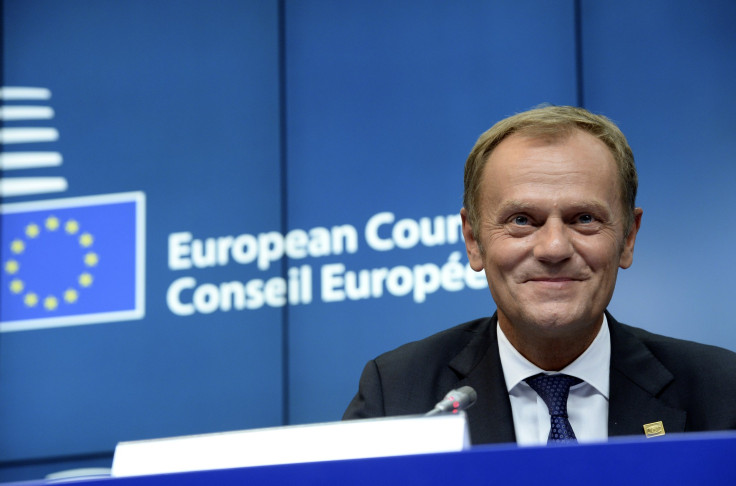Donald Tusk: Five Things To Know About The New European Council President

Donald Tusk, the prime minister of Poland, was chosen unanimously by European leaders as the next president of the European Council. The president is the European Union, or EU's primary representative on the international stage.
Tusk will take office Dec. 1, replacing incumbent, Belgian Prime Minister Herman Van Rompuy. Tusk will be joined by Italian Foreign Minister Federica Mogherini, who is taking up the role of EU foreign policy chief.
Here are five things to know about the new president of the European Council:
He faces foreign policy challenges: Tusk is likely to have to deal with either the fallout or a continuing crisis involving Russia and Ukraine. The EU is weighing sanctions against Russia for what it believes is Moscow's military incursion into the country. EU economies, however, are closely tied to Russia. Germany obtains almost 40 percent of its natural gas via a Russian pipeline, London's financial institutions cater to a large number of wealthy Russians, and France is in the process of manufacturing two warships for sale to Russia. The balancing of diplomatic and economic interests will not be an easy one.
He faces pressure to reform the EU: The U.K. government has promised to hold a referendum on it's continued membership of the EU if the conservative government retains power. The country is likely at the very least to want to renegotiate the terms of its membership, which has historically not been particularly popular in Britain.
Tusk has said “No reasonable person can imagine the EU without the U.K. I cannot imagine it myself. I have talked about it with David Cameron. We can reach an agreement.”
Tusk reportedly secured the U.K. leader's backing for his appointment by pledging to back British proposals to change the way the EU operates, which are unlikely to be popular among other members.
He's a trailblazer: Tusk's appointment represents the first time a former communist-bloc nation has taken a major European leadership position since the fall of the Berlin Wall. Tusk is a former activist in Poland's Solidarity trade union federation, which was the leading member of the country's first post-communist-era government in 1989.
He is not a linguist: Tusk speaks only “halting” English, and no French, the two main languages of the European bureaucracy. Al-Jazeera reports Tusk denied his poor command of foreign languages would handicap him as EU president.
He has, the Financial Times said, promised to “polish” his English before taking office, saying: “Nothing is good enough for Europe, including my English today.”
He's the hawk; she's the dove: Perhaps unsurprisingly, given the history of Polish-Russian relations, Tusk is considered a leading EU hawk on the Kremlin and the crisis in Ukraine.
The Guardian reported his strong positions on Russia and Ukraine were what helped win Italy's foreign minister Federica Mogherini her role as EU foreign policy chief. Many eastern European nations called Mongherini too soft on Russia and President Vladimir Putin. The paper said the emergence of the Tusk-Mogherini ticket removed that opposition as Poland has been leading the campaign for a more energetic anti-Putin and pro-Ukraine policy.
© Copyright IBTimes 2024. All rights reserved.












